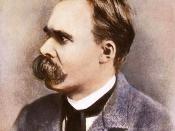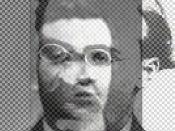Nietzsche "God is dead."� Friedreich Nietzsche boldly stated this in respect toward the Christian God. The "Christian God" no longer retains any of his great power over the world and mankind. "The Supreme Being also stands for the "ÃÂ"transcendent"' in general in its various meanings, which constitute "ÃÂ"ideals"' and "ÃÂ"norms,"' "ÃÂ"principles"' and "ÃÂ"rules,"' "ÃÂ"ends"' and "ÃÂ"values."' These meanings are located "ÃÂ"above"' the being, for the expression of clarity"� (Heidegger: 4 v. IV). "God is dead" is one of Nietzsche's most famous quotations. It disrupts one of the root institutions of European society: the church. For Christians, God is the focal point of their religion. Nietzsche deliberately crushes this system. The optimism and hope for salvation that Europeans receive from their religion slightly wavers, which creates doubt. This doubt, is in turn, implemented into the society of these people, and therefore, incorporates a much bleaker outlook on life. Nietzsche's philosophy of pessimism was evident in the Nihilist movement and the Holocaust.
In the eighteenth century there was a great surge in scientific discoveries and new philosophies. This period is known as the Enlightenment, and had its focal point in France. Feeling, imagination, experience, and yearning were the characteristics of the Enlightenment thinkers. The most prominent philosophers of this period were Voltaire, Montaigne, and Rousseau. During this era there were many scientific discoveries. Newton found the Law of Gravity and explored the laws of inertia. Copernicus discovered the sun as the center of the universe. "The great mathematics of calculus was founded which created a better understanding of wind resistance, and mechanics. The new natural sciences had revealed that nature was subject to reason"� (Gaarder: 315). People could now relate to nature as it corresponded with the natural Seidman 2 laws. These philosophies further supported that God was the creator of nature.


